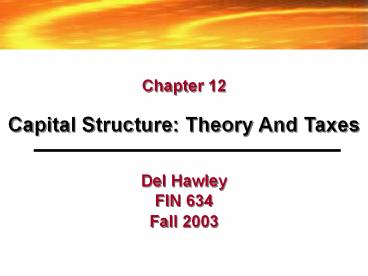FINANCIAL ADMINISTRATION OF THE FIRM FIN 5043--930 - PowerPoint PPT Presentation
Title:
FINANCIAL ADMINISTRATION OF THE FIRM FIN 5043--930
Description:
Has been a key issue in finance theory & practice since 1958 ... Decreases in the personal tax rates on equity income yield decreased corporate debt usage. ... – PowerPoint PPT presentation
Number of Views:18
Avg rating:3.0/5.0
Title: FINANCIAL ADMINISTRATION OF THE FIRM FIN 5043--930
1
Chapter 12
Capital Structure Theory And Taxes
Del HawleyFIN 634
Fall 2003
2
Overview Of Capital Structure Theory Practice
- The capital structure question can the mix of
debt and equity a firm issues affect its total
market valuation? - Has been a key issue in finance theory practice
since 1958 - Capital Structure patterns observed worldwide
- Similarities differences between US, other OECD
countries - The Agency Cost/Tax Trade-Off Theory of capital
structure - Not perfect, but works better than principal
competitors - Time wont allow examination of other two
theories - The Modigliani-Miller capital structure
irrelevance propositions - Perfect capital markets assumption underlying
Proposition I - Proposition IIs implications for corporate
financial policy - The impact of income taxes on the irrelevance
propositions - Corporate income tax 100 debt is optimal
- Irrelevance perhaps rescued by personal taxes
3
Capital Structure Patterns Observed Worldwide
- Capital structures have strong industry patterns,
and these are the same around the world. - High debt-to-equity industries utilities,
transport cos, and mature, capital-intensive
manufacturing firms - Low D/E industries service firms, mining
companies, most rapidly growing or
technology-based manufacturing firms - Implies an industry's optimal asset mix
influences CSs chosen by firms in that industry
anywhere
4
Market Value Debt Ratios, Selected U.S.
Corporations, July 2002
5
Leverage Ratios For G-7 And Selected Developing
Countries, 1980-91
Source Rajan and Zingales, What do We Know
About Capital Structure Some Evidence
from International Data, Journal of Finance 50
(1995).
6
CS Patterns Observed Worldwide (Continued)
- Leverage ratios are inversely related to the
perceived costs of financial distress. - Both across industries across countries, the
more costly is financial distress, the less debt
will be used. - Companies rich in collateralizeable assets have
higher leverage than firms rich in growth
options. - Within industries, leverage is inversely related
to profitability - In all industries, the most profitable companies
typically borrow the least, suggesting that CS at
least partly residual - Corporate personal taxes influence capital
structures, but they neither cause nor prevent
corporate leverage. - US corps used as much debt before 1913 as after
- Increased corporate tax rates yield increased
debt usage - Decreases in the personal tax rates on equity
income yield decreased corporate debt usage.
7
Market-Value Leverage Ratios (Total Debt-to-Total
Capital) For US Corporations, 1929-1993
1990
1980
1970
1960
1940
1950
1930
8
Capital Structure Patterns Observed Worldwide
(Continued)
- Existing S/Hs consider leverage-increasing events
"good news" and leverage-decreasing events "bad
news" - Stock prices rise when leverage-increasing events
announced, but fall for leverage-decreasing
events. - Corporations that are forced away from a
preferred capital structure tend to return to
that structure over time - Has occurred frequently, particularly for US
firms that have taken on large amounts of new
debt to finance takeovers. - More generally, corporations like to operate
within target leverage zones, and will issue new
equity when debt ratios get too high and will
issue debt if they fall too low.
9
Theoretical Models Of Capital Structure
- First important theoretical model in corporate
finance was Modigliani Millers (MM) capital
structure model in 1958 - In frictionless capital markets, with no taxes or
transactions costs, CS is irrelevant--doesnt
affect valuation - Todays best theoretical explanation for observed
CS patterns is the Agency Cost/Tax Shield
Trade-Off Model - Assumes that observed CSs result from firms
trading off the tax benefits of debt usage
against the increasingly severe agency costs as
debt ratios approach critical levels - The Pecking Order Theory based on two key
assumptions - (1) managers are better informed about the
investment opportunities faced by their firms
than are outsiders (2) managers act in the best
interests of existing shareholders. - Signaling Model of CS also assumes asymmetric
information - but managers use debt as a costly signal to
differentiate their firms from weaker competitors
10
The MM Capital Structure Model
- Assumptions of the MM Capital Structure Model
- All physical assets are owned by corporations
- Frictionless Capital markets no corporate or
personal income taxes, securities are traded
costlessly, no bankruptcy costs - Corporations can issue only risky equity and
risk-free debt - Both individuals and corporations can borrow or
lend at the risk-free interest rate - Investors have identical expectations about the
future stream of corporate profits - There is no growth all cash flow streams are
perpetuities and - All corps can be classified into one of several
"equivalent return classes" with returns on
shares of all firms proportional to, and
perfectly correlated with, all other firms in
that class. - Seems absurdly unrealistic, but model very robust
- Only costless bankruptcy and no taxes are
critical assumptions.
11
MMs Proposition I Capital Structure Irrelevance
See Example Spreadsheet
12
Table C Income Statements For Unleverco
Leverco With Corporate Income Taxes































